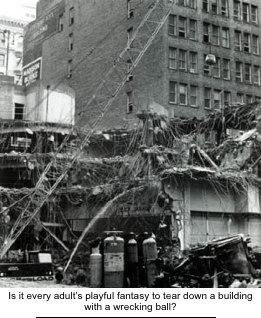 |  | ||
| of mindlessly observes how something works or doesn’t work or what its features are, much as I did when, as a child, I used to go around the house with an empty milk bottle pouring a little bit of every chemical, every drug, every spice into the bottle to see what would happen. Of course, nothing happened. I ended up with a sticky grey-brown mess, which I threw out in disgust. But much research ends up with the same amorphous mess and is or should be thrown out only to then start playing around in some other way. But a research physicist gets paid for this “waste of time” and so do the people who develop exhibits in the Exploratorium. Occasionally though, something incredibly wonderful happens. But if people get paid for playing, does it then become work? The recognition of adult play can become very difficult. In some instances, the playfulness is obvious. For example, there are times while driving that I keep time to radio music with the accelerator and the brake to produce a quite remarkable motion of the car. It’s true that this activity is manifestly playful. It uses the automobile out of the context for which it was designed, but it is also an extremely trivial example of adult play. The problem of talking about adult play becomes difficult because there are some people who are never playful in their work or their studying. I once asked Bob Karplus, a professor at U.C. Berkeley, a question that I | |||
| grain silo certainly seems like play even though it was justified as publicity. This example illustrates the difficulty in distinguishing adult work from play. The distinction can become very blurred when people get paid for play. One of the more productive employees of the Exploratorium said to me some years ago that he felt confused because what he was doing much of the time in the machine shop was just playing around with no particular purpose. He didn’t see why he should be paid for doing that, even though his playing around sometimes resulted in the birth of wonderful and instructive exhibits: exhibits whose major purpose or form was in no way conceived at the outset of the playing around. My brother, when he was a young man, said his teaching made him feel that he was giving somebody their money’s worth, whereas almost none of his research calculations had anything to do with anything. It seemed hard for him to justify his being paid for just doing research. Whether it is exhibit-building or research or sculpture, so much time is spent just playing around with no particular end in mind. One sort | |||